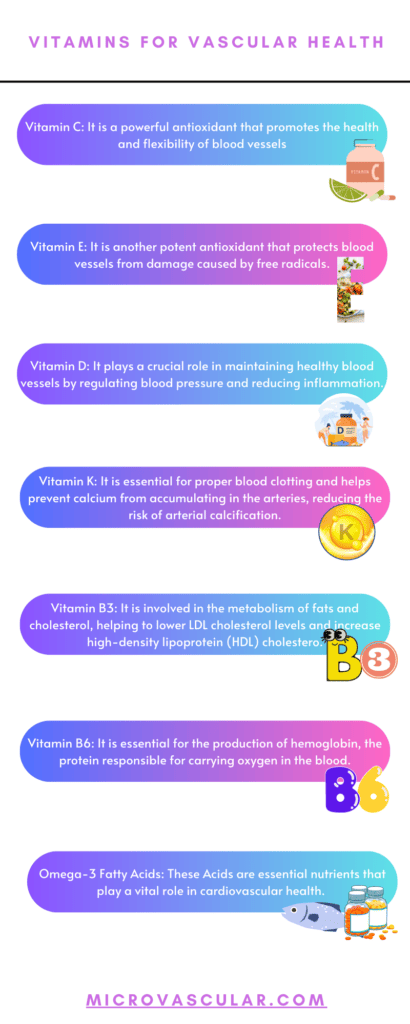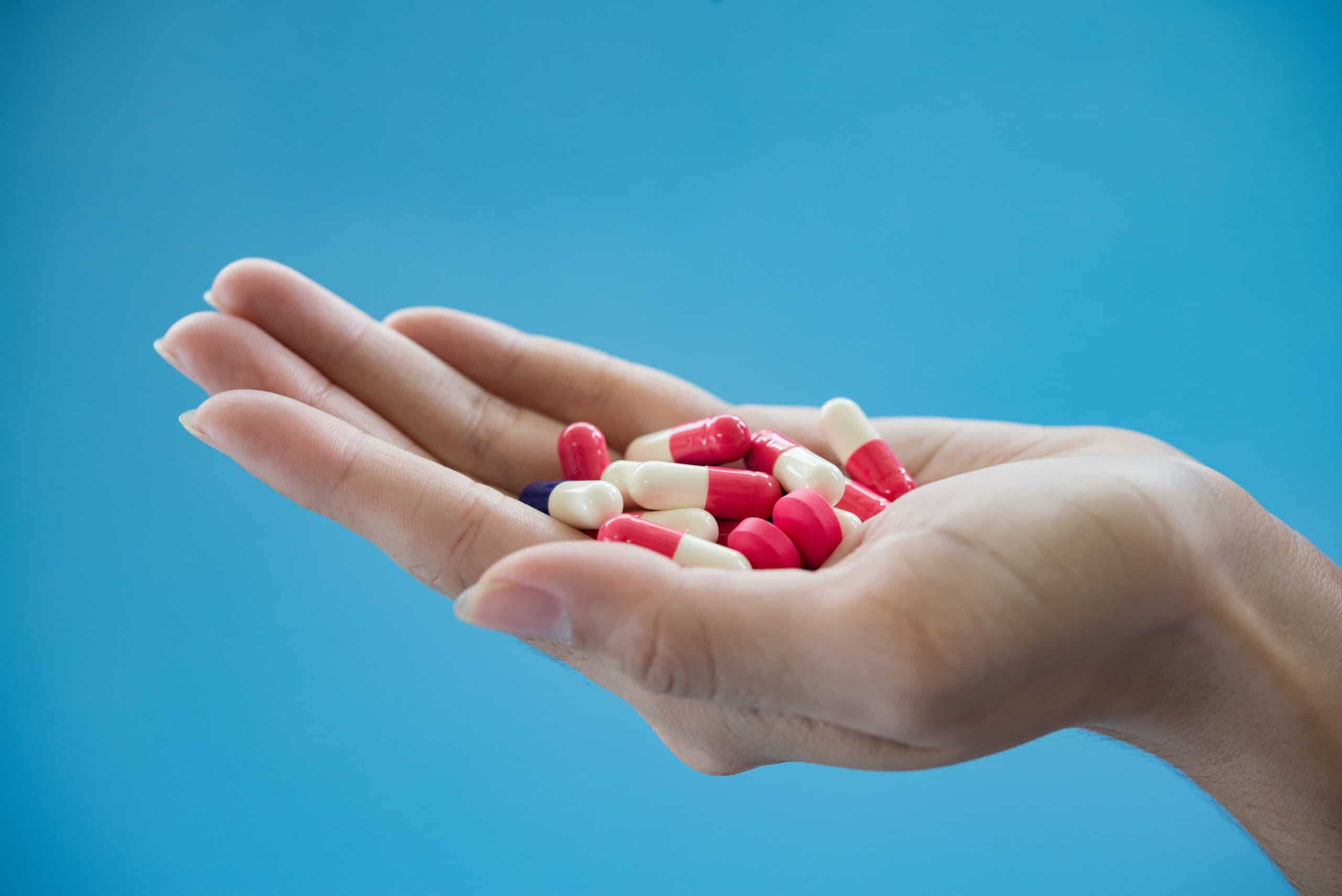
Introduction:
The vascular system, consisting of arteries, veins, and capillaries, serves as a critical network within our bodies, transporting blood, oxygen, and nutrients to various organs and tissues. Maintaining the health and functionality of this intricate system is paramount to our overall well-being. However, factors such as age, lifestyle choices, and genetic predisposition can contribute to the development of cardiovascular conditions and compromise vascular health. Fortunately, incorporating specific vitamins into our daily diet can significantly support and improve the health of our blood vessels and promote optimal vascular function.
The vascular system, often referred to as the circulatory system, is responsible for the delivery of oxygen and nutrients to every part of our body. It plays a crucial role in maintaining cellular functions, regulating body temperature, and removing waste products. The heart acts as the central pump, while the blood vessels serve as the intricate highways that transport oxygen-rich blood from the heart to various organs and tissues and return deoxygenated blood back to the heart.
However, the wear and tear of daily life, along with other factors like poor diet, sedentary lifestyle, smoking, and certain medical conditions, can contribute to the development of vascular issues such as atherosclerosis, hypertension, and poor blood circulation. These conditions can significantly impact our quality of life and increase the risk of more severe cardiovascular events.
Fortunately, nature has provided us with a range of vitamins that play a crucial role in supporting and maintaining vascular health. By incorporating these essential nutrients into our diet, we can enhance the strength, flexibility, and integrity of our blood vessels, reduce inflammation, and improve overall cardiovascular well-being.
In this blog, we will delve into the seven best vitamins for boosting vascular health and explore their individual roles in supporting optimal vascular function. We will discuss how each vitamin contributes to reducing the risk of cardiovascular diseases, improving blood flow, reducing inflammation, and maintaining the elasticity of blood vessels. By understanding the importance of these vitamins and their sources, we can make informed choices to include them in our daily meals and promote long-term vascular health.
Remember, while vitamins can offer valuable support, it is essential to consult with a healthcare professional before making any significant changes to your diet or starting any new supplements. They can provide personalized advice based on your specific health needs, medications, and existing medical conditions.
Best Vitamins for Vascular Health:

Let us embark on this journey of exploring the seven best vitamins for boosting vascular health and discover how we can nourish our bodies and prioritize our cardiovascular well-being. Together, we can pave the way for a healthier and more resilient vascular system that supports a vibrant and fulfilling life.
- Vitamin C:
Vitamin C is a powerful antioxidant that promotes the health and flexibility of blood vessels. It aids in the production of collagen, a protein that provides structural support to blood vessels, reducing the risk of plaque buildup and maintaining their elasticity. Citrus fruits, strawberries, bell peppers, and leafy greens are excellent sources of vitamin C.
- Vitamin E:
Vitamin E is another potent antioxidant that protects blood vessels from damage caused by free radicals. It helps prevent the oxidation of low-density lipoprotein (LDL) cholesterol, commonly known as “bad” cholesterol, which can contribute to the formation of plaque. Nuts, seeds, spinach, and fortified cereals are rich sources of vitamin E.
- Vitamin D:
Vitamin D plays a crucial role in maintaining healthy blood vessels by regulating blood pressure and reducing inflammation. It also supports calcium absorption, promoting bone health and preventing the hardening of blood vessels. Natural sources of vitamin D include sunlight exposure, fatty fish like salmon and mackerel, and fortified dairy products.
- Vitamin K:
Vitamin K is essential for proper blood clotting and helps prevent calcium from accumulating in the arteries, reducing the risk of arterial calcification. Leafy green vegetables, broccoli, Brussels sprouts, and fermented foods like sauerkraut are excellent sources of vitamin K.
- Vitamin B3 (Niacin):
Vitamin B3, also known as niacin, is involved in the metabolism of fats and cholesterol, helping to lower LDL cholesterol levels and increase high-density lipoprotein (HDL) cholesterol, known as “good” cholesterol. Niacin also improves blood flow and reduces inflammation. Fish, poultry, whole grains, and legumes are good sources of niacin.
- Vitamin B6:
Vitamin B6 is essential for the production of hemoglobin, the protein responsible for carrying oxygen in the blood. It also helps regulate homocysteine levels, an amino acid linked to an increased risk of cardiovascular disease. Foods rich in vitamin B6 include poultry, fish, bananas, and fortified cereals.
- Omega-3 Fatty Acids:
While not a vitamin, omega-3 fatty acids are essential nutrients that play a vital role in cardiovascular health. They help reduce inflammation, lower blood pressure, and improve blood vessel function. Fatty fish such as salmon, tuna, and sardines, as well as flaxseeds, chia seeds, and walnuts, are excellent sources of omega-3 fatty acids.
Conclusion:
In conclusion, we have explored the importance of maintaining optimal vascular health and how specific vitamins can play a significant role in supporting and improving the health of our blood vessels. The seven best vitamins for boosting vascular health have been discussed in detail throughout this blog, highlighting their individual benefits and contributions to cardiovascular well-being.
By incorporating these vitamins into our daily diet and lifestyle choices, we can actively support the strength, flexibility, and integrity of our blood vessels. They can help reduce the risk of cardiovascular diseases, promote proper blood circulation, and contribute to overall cardiovascular health.
However, it is important to note that vitamins alone cannot guarantee complete vascular health. A holistic approach that includes a balanced diet, regular exercise, stress management, and avoidance of harmful habits is essential for maintaining a healthy cardiovascular system.
Remember to consult with a healthcare professional before making any significant changes to your diet or starting new supplements, as they can provide personalized advice based on your specific health needs and medical history.
Empower yourself with the knowledge gained from this blog about the seven best vitamins for boosting vascular health. Use this information to make informed choices and take proactive steps towards improving your cardiovascular well-being.
Together, let us prioritize the health of our blood vessels and embrace a lifestyle that nourishes and supports a vibrant and fulfilling life. By integrating these essential vitamins and adopting a holistic approach to vascular health, we can pave the way for a healthier cardiovascular system and enjoy the benefits of enhanced vitality and longevity.
Here’s to your continued journey towards optimal vascular health!

